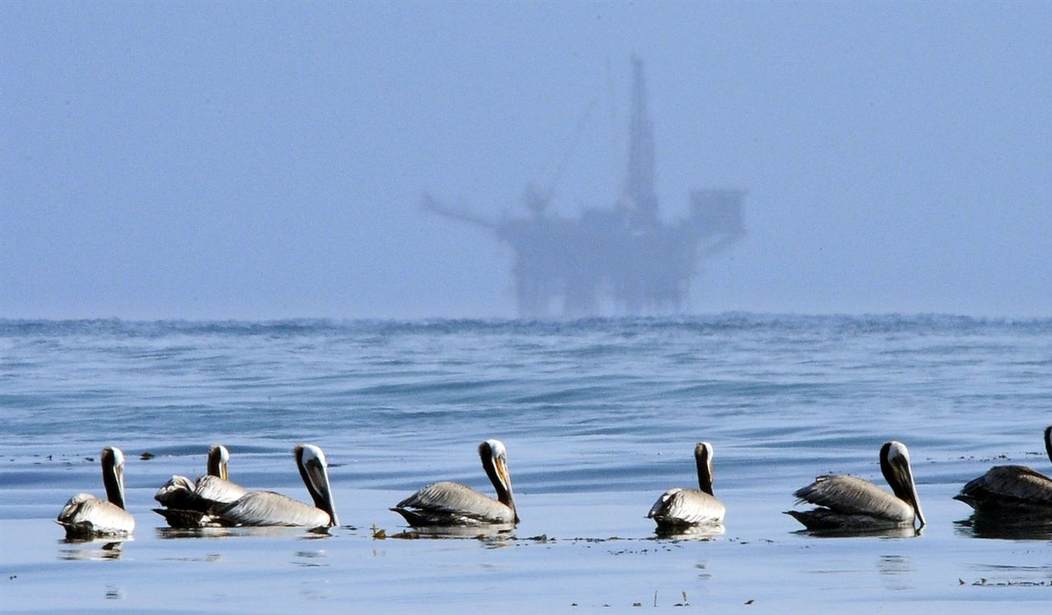“Louisiana officials say the state’s oil and gas industry is in danger. This comes after President Joe Biden cancelled a March oil lease sale in the Gulf of Mexico. Nearly 80 million acres of available leases would have been sold this week. The damage to Louisiana’s (and the nation’s) oil and gas companies started in January when President Biden signed an executive order banning all new oil and gas leases on public land and waters for 60 days," reports KLFY.
Now for the cheering:
“Cancelling this huge offshore Gulf oil auction helps protect our climate and life on Earth. President Biden understands the urgent need to keep this oil in the ground…This is a great step toward phasing out all offshore drilling and bringing environmental justice to the Gulf Coast and Alaska. We need to help restore coastal communities and marine life," the Center for Biological Diversity said in a statement.
And speaking of “marine life.” If bona-fide science has crowned “Global Warmists” with 10-foot dunce caps, then over half a century of scientific evidence has crowned anti-offshore drilling activists with 50-foot dunce caps. That offshore oil drilling—far from an environmental disaster, is empirically an environmental bonanza—has been pounded home with a vengeance in study after study. The science, you might say, is settled. To wit:
According to the Energy Information Administration, "Gulf of Mexico federal offshore oil production accounts for 17% of total U.S. crude oil production." Yet with over 3000 of the 4000 plus offshore oil production platforms in the Gulf of Mexico off her coast, Louisiana provides almost a third of North America’s commercial fisheries.
A study by LSU’s sea grant college showed that 70 percent of Louisiana’s offshore fishing trips target these structures. “Oil platforms as artificial reefs support fish densities 10 to 1000 times that of adjacent sand and mud bottom, and almost always exceed fish densities found at both adjacent artificial reefs of other types and natural hard bottom,” revealed a study by Dr. Bob Shipp, professor at the Marine Sciences department of the University of South Alabama in Mobile, Alabama. “Evidence indicates that massive areas of the northwestern Gulf of Mexico were essentially empty of Red Snapper stocks for the first hundred years of the fishery. Subsequently, areas in the western Gulf have become the major source of red snapper, concurrent with the appearance of thousands of petroleum platforms.”
Recommended
In brief, “villainous” Big Oil produces marine life at rates that puts to shame “wondrous” Earth Goddess Gaia. “The fish Biomass around an offshore oil platform is ten times greater per unit area than for natural coral reefs,” also found Dr. Charles Wilson of LSU’s Department of Oceanography and Coastal Science (emphasis added). "Ten to thirty thousand adult fish live around an oil production platform in an area half the size of a football field.”
But you’re very conveniently “forgetting” the infamous BP oil spill! comes the retort from Environmentalist Whackos.
Glad you mentioned that. Because only one year after the infamous spill, the FDA’s Gulf Coast Seafood Laboratory, the National Oceanic and Atmospheric Administration’s National Seafood Inspection Laboratory, the Louisiana Department of Wildlife and Fisheries, the Louisiana Department of Health and Hospitals, along with similar agencies from neighboring Gulf coast states, have methodically and repeatedly tested Gulf seafood for cancer-causing “polycyclic aromatic hydrocarbons.”
“Not a single sample [for oil or dispersant] has come anywhere close to levels of concern,” reported Olivia Watkins, executive media advisor for the Louisiana Department of Wildlife and Fisheries.
“All of the samples have been 100-fold or even 1,000-fold below all of these levels,” reported Bob Dickey, director of the FDA’s Gulf Coast Seafood Laboratory. “Nothing ever came close to these levels.”
That this proliferation of seafood in the Gulf of Mexico came because – rather than in spite – of the oil production rattled many environmental cages and provoked a legion of scoffers.
Amongst the scoffers were some Travel Channel producers, fashionably greenish in their views. They read these claims in a book by yours truly—"The Helldiver’s Rodeo”—that Publishers Weekly hailed as “highly-entertaining!” (Ted Nugent’s blurb certainly didn’t help against their scoffing!)
The book describes an undersea panorama that (if true) could make an interesting show for the network, they concluded, while still scoffing. They scoffed as we rode in from the airport. They scoffed over raw oysters, grilled redfish and seafood gumbo that night. More scoffing through the Hurricanes at Pat O’Brien’s. They scoffed even while suiting up in dive gear and checking the cameras as we tied up to an oil platform 20 miles in the Gulf off the southeast Louisiana coast.
But they came out of the water bug-eyed and indeed produced and broadcast a Travel Channel program showcasing a panorama that turned on its head every environmental superstition against offshore oil drilling. Schools of fish filled the water column from top to bottom – from 6-inch blennies to 12-foot sharks. Fish by the thousands. Fish by the ton.
The cameras were going crazy. Do I focus on the shoals of barracuda? Or that cloud of jacks? On the immense schools of snapper below, or on the fleet of tarpon above? How ’bout this – whoa – hammerhead! We had some close-ups, too, of coral and sponges, the very things disappearing off Florida’s pampered reefs—a state that bans offshore oil drilling. Off Louisiana, they sprout in colorful profusion from the huge steel beams —acres of them. You’d never guess this was part of that unsightly structure above. The panorama of marine life around an offshore oil platform staggers anyone who puts on goggles and takes a peek, even (especially!) the most worldly scuba divers. Here’s a video peek at this seafood bonanza.
And here’s the book that caused so many “environmentalist” heads to explode.

























Join the conversation as a VIP Member